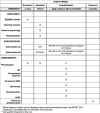Extracorporeal carbon dioxide removal for acute hypercapnic exacerbations of chronic obstructive pulmonary disease: study protocol for a randomised controlled trial
- PMID: 31362776
- PMCID: PMC6664508
- DOI: 10.1186/s13063-019-3548-4
Extracorporeal carbon dioxide removal for acute hypercapnic exacerbations of chronic obstructive pulmonary disease: study protocol for a randomised controlled trial
Abstract
Background: Chronic obstructive pulmonary disease (COPD) is a common cause of chronic respiratory failure and its course is punctuated by a series of acute exacerbations which commonly lead to hospital admission. Exacerbations are managed through the application of non-invasive ventilation and, when this fails, tracheal intubation and mechanical ventilation. The need for mechanical ventilation significantly increases the risk of death. An alternative therapy, extracorporeal carbon dioxide removal (ECCO2R), has been shown to be efficacious in removing carbon dioxide from the blood; however, its impact on respiratory physiology and patient outcomes has not been explored.
Methods/design: A randomised controlled open label trial of patients (12 in each arm) with acute exacerbations of COPD at risk of failing conventional therapy (NIV) randomised to either remaining on NIV or having ECCO2R added to NIV with a primary endpoint of time to cessation of NIV. The change in respiratory physiology following the application of ECCO2R and/or NIV will be measured using electrical impedance tomography, oesophageal pressure and parasternal electromyography. Additional outcomes, including patient tolerance, outcomes, need for readmission, changes in blood gases and biochemistry and procedural complications, will be measured. Physiological changes will be compared within one patient over time and between the two groups. Healthcare costs in the UK system will also be compared between the two groups.
Discussion: COPD is a common disease and exacerbations are a leading cause of hospital admission in the UK and worldwide, with a sizeable mortality. The management of patients with COPD consumes significant hospital and financial resources. This study seeks to understand the feasibility of a novel approach to the management of patients with acute exacerbations of COPD as well as to understand the underlying physiological changes to explain why the approach does or does not assist this patient cohort. Detailed respiratory physiology has not been previously undertaken using this technique and there are no other randomised controlled trials currently in the literature.
Trial registration: ClinicalTrials.gov, NCT02086084.
Keywords: Acute exacerbations of chronic obstructive pulmonary disease; COPD; ECCO2R; Extracorporeal CO2 removal; NIV; Non-invasive ventilation.
Conflict of interest statement
The authors declare that they have no competing interests.
Figures

Similar articles
-
Extracorporeal carbon dioxide removal for treatment of exacerbated chronic obstructive pulmonary disease (ORION): study protocol for a randomised controlled trial.Trials. 2021 Oct 19;22(1):718. doi: 10.1186/s13063-021-05692-w. Trials. 2021. PMID: 34666820 Free PMC article.
-
The feasibility and safety of extracorporeal carbon dioxide removal to avoid intubation in patients with COPD unresponsive to noninvasive ventilation for acute hypercapnic respiratory failure (ECLAIR study): multicentre case-control study.Intensive Care Med. 2016 Sep;42(9):1437-44. doi: 10.1007/s00134-016-4452-y. Epub 2016 Jul 25. Intensive Care Med. 2016. PMID: 27456703
-
Physiological Assessment of ECCO2R on the Work of Breathing in Exacerbations of COPD.COPD. 2024 Dec;21(1):2436169. doi: 10.1080/15412555.2024.2436169. Epub 2024 Dec 5. COPD. 2024. PMID: 39639560 Clinical Trial.
-
Intermittent extracorporeal CO2 removal in chronic obstructive pulmonary disease patients: a fiction or an option.Curr Opin Crit Care. 2018 Feb;24(1):29-34. doi: 10.1097/MCC.0000000000000471. Curr Opin Crit Care. 2018. PMID: 29135616 Review.
-
[Severe hypercapnic respiratory failure in acute exacerbation of COPD: significance of ventilation and extracorporal CO2 removal].Dtsch Med Wochenschr. 2016 Nov;141(24):1758-1762. doi: 10.1055/s-0042-118023. Epub 2016 Nov 30. Dtsch Med Wochenschr. 2016. PMID: 27903026 Review. German.
Cited by
-
Effect of Respiration Training-Assisted Western Medicine Therapy on Activity Tolerance, Pulmonary Function, and Quality of Life of Chronic Obstructive Pulmonary Disease Patients in the Stable Phase.J Healthc Eng. 2022 Mar 30;2022:9427602. doi: 10.1155/2022/9427602. eCollection 2022. J Healthc Eng. 2022. Retraction in: J Healthc Eng. 2023 Jan 26;2023:9865734. doi: 10.1155/2023/9865734. PMID: 35399844 Free PMC article. Retracted.
-
Ipratropium bromide and noninvasive ventilation treatment for COPD.Am J Transl Res. 2022 May 15;14(5):3319-3326. eCollection 2022. Am J Transl Res. 2022. PMID: 35702113 Free PMC article.
-
Long noncoding RNA MCM3AP antisense RNA 1 is downregulated in chronic obstructive pulmonary disease and regulates human bronchial smooth muscle cell proliferation.J Int Med Res. 2020 Sep;48(9):300060520935215. doi: 10.1177/0300060520935215. J Int Med Res. 2020. PMID: 32940099 Free PMC article.
-
A randomised controlled trial of non-invasive ventilation compared with extracorporeal carbon dioxide removal for acute hypercapnic exacerbations of chronic obstructive pulmonary disease.Ann Intensive Care. 2022 Apr 21;12(1):36. doi: 10.1186/s13613-022-01006-8. Ann Intensive Care. 2022. PMID: 35445986 Free PMC article.
-
[Recent research on extracorporeal carbon dioxide removal].Zhongguo Dang Dai Er Ke Za Zhi. 2023 Feb 15;25(2):205-209. doi: 10.7499/j.issn.1008-8830.2208187. Zhongguo Dang Dai Er Ke Za Zhi. 2023. PMID: 36854699 Free PMC article. Chinese.
References
Publication types
MeSH terms
Substances
Associated data
Grants and funding
LinkOut - more resources
Full Text Sources
Medical

